|
|
|
Sort Order |
|
|
|
Items / Page
|
|
|
|
|
|
|
| Srl | Item |
| 1 |
ID:
111183
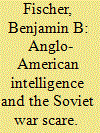

|
|
|
|
|
| Publication |
2012.
|
| Summary/Abstract |
During the Soviet war scare of the 1980s, British intelligence shared vital information from KGB officer Oleg Gordievsky with its American partners. The US intelligence community, however, was suspicious of the message and the messenger, dismissing Soviet 'war talk' as disinformation. Some officials even believed that the British had tweaked their reports to influence US policy. President Ronald Reagan, however, on the advice of Prime Minister Margaret Thatcher, listened to Gordievsky rather than his intelligence advisors. The war scare had a profound influence on Reagan's thinking about nuclear war, Kremlin fears, and Soviet-American relations that led him to seek a new détente with Moscow and the end of the Cold War through diplomacy rather than confrontation. Subsequent events and post-Cold War revelations vindicated Gordievsky. Reagan sought his advice on the eve of his first summit meeting with Mikhail Gorbachev and later expressed his gratitude during a private meeting in the Oval Office.
|
|
|
|
|
|
|
|
|
|
|
|
|
|
|
|
| 2 |
ID:
049663
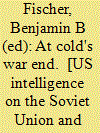

|
|
|
|
|
| Publication |
U.S.A, Central Intelligence Agency, 1999.
|
| Description |
ix, 378p.
|
| Standard Number |
1929667027
|
|
|
|
|
|
|
|
|
|
|
|
Copies: C:1/I:0,R:0,Q:0
Circulation
| Accession# | Call# | Current Location | Status | Policy | Location |
| 042309 | 327.1273/FIS 042309 | Main | On Shelf | General | |
|
|
|
|
| 3 |
ID:
132418
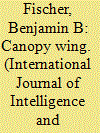

|
|
|
|
|
| Publication |
2014.
|
| Summary/Abstract |
Although Winston Churchill declared that history is always written by the victors, never the vanquished, a group of former East German foreign intelligence officers seem determined to prove him wrong. Calling themselves Insiders have been churning out books since the end of the Cold War that recount the history of that conflict from their perspective. The Insiders' mantra is that they were on the right, even if losing, side because they "spied for peace" to protect the Warsaw Pact against the existential threat posed by the "aggressive intentions" of the West.
|
|
|
|
|
|
|
|
|
|
|
|
|
|
|
|
| 4 |
ID:
047710
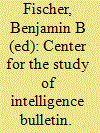

|
|
|
|
|
| Publication |
Washington,D C, Central Intelligence Agency, 2000.
|
| Description |
19p.
|
|
|
|
|
|
|
|
|
|
|
|
Copies: C:1/I:0,R:0,Q:0
Circulation
| Accession# | Call# | Current Location | Status | Policy | Location |
| 043678 | 327.12/FIS 043678 | Main | On Shelf | General | |
|
|
|
|
| 5 |
ID:
146171
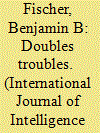

|
|
|
|
|
| Summary/Abstract |
Double agents are a special breed of people. They pretend to spy for one foreign intelligence service while actually spying for another. All intelligence services fall victim to such deception from time to time. It's all part of the “wilderness of mirrors” in spy wars where illusion and reality coexist and confound. Former Director of Central Intelligence (DCI) Richard Helms once told Congress that detecting a double-agent operation is “one of the most difficult and tricky aspects of intelligence work, and there isn't anybody who's been in it very long who hasn't been tricked once, twice, maybe many times.”
|
|
|
|
|
|
|
|
|
|
|
|
|
|
|
|
| 6 |
ID:
181297
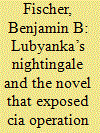

|
|
|
|
|
| Summary/Abstract |
When Yuri Andropov offered to divulge how the Komitet Gosudarstvennoy Bezopasnosti (KGB) foiled an important Central Intelligence Agency (CIA) operation, Julian Semyonov (“Lubyanka’s nightingale”) jumped at the chance to write a spy thriller based on real people and events. TASS is Authorized to Announce … (1979) is a fictional version of a CIA operation involving Soviet diplomat Aleksandr Ogorodnik (a.k.a. TRIGON). The novel confirms Director of Central Intelligence Stansfield Turner’s suspicion that Ogorodnik was a KGB dangle whose rumored suicide was false. It also foreshadowed the KGB’s bogus claim that the CIA was an accessory to Ogorodnik’s murder of his mistress. Andropov sponsored the work of fiction as a subtle way of revealing clues that he had outfoxed the Agency.
|
|
|
|
|
|
|
|
|
|
|
|
|
|
|
|
| 7 |
ID:
153157
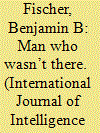

|
|
|
|
|
| Summary/Abstract |
The agent Stombaugh was supposed to meet was named Adolf Tolkachev. Tolkachev was, or claimed to be, a senior designer employed at a secret defense facility, the Scientific Research Institute for Radio Engineering, which developed radars for military aircraft. The CIA considers him to have been its most important Soviet agent after Col. Oleg Penkovsky, a military intelligence officer who spied on the eve of the Cuban missile crisis.
|
|
|
|
|
|
|
|
|
|
|
|
|
|
|
|
| 8 |
ID:
188271
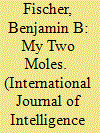

|
|
|
|
|
| Summary/Abstract |
During my career, I had the dubious experience of crossing paths with the two most notorious foreign intelligence penetrations (“moles”) of the U.S. Intelligence Community (IC) during and after the Cold War: Central Intelligence Agency (CIA) officer Aldrich (Rick) Ames and Federal Bureau of Investigation (FBI) agent Robert Hanssen.
|
|
|
|
|
|
|
|
|
|
|
|
|
|
|
|
| 9 |
ID:
191105
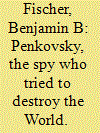

|
|
|
|
|
| Summary/Abstract |
Central Intelligence Agency (CIA) lore and popular culture tout Col. Oleg Penkovsky as “the spy who saved the world” during the Berlin and Cuban missile crises. In fact, his contribution to U.S. intelligence and policymaking is exaggerated, distorted, and in several instances falsified. More disturbing, Penkovsky harbored a murderous rage against the Soviet system and repeatedly tried to inveigle the West in a quixotic quest to destroy it. He devised a plan to blow up Moscow, advocated preventive war against the Soviet Union, fanned the flames of the Berlin crisis with false reports of Kremlin mobilization for war, and recommended assassinating Soviet leader Nikita Khrushchev. Penkovsky allegedly provided critical information that bought time for President John F. Kennedy to devise a diplomatic solution to the Cuban crisis before Soviet missiles were ready to fire. Not true, according to the president’s advisers. New information reveals that some Soviet missiles were combat-ready two days before U.S. intelligence discovered the first incomplete launch site. The State Committee for Security (KGB) allowed Penkovsky to continue spying for at least ten months after he came under suspicion, perhaps to protect a mole in American or British intelligence. A senior CIA officer claimed that, meanwhile, the Soviets controlled and manipulated Penkovsky without his knowledge. Even after his arrest, Penkovsky may have attempted to instigate a nuclear war by tricking the KGB into sending a false alert of an impending Soviet surprise attack on the United States.
|
|
|
|
|
|
|
|
|
|
|
|
|
|
|
|
| 10 |
ID:
158529
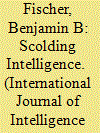

|
|
|
|
|
| Summary/Abstract |
In October 2015, the private sector National Security Archive announced that it had won a 12-year legal battle to obtain a highly classified report prepared by the President’s Foreign Intelligence Advisory Board (PFIAB) in 1990. Titled “The Soviet War,” the document is a 110-page postmortem on an issue that had roiled the Intelligence Community (IC) during the 1980s, namely whether some Soviet leaders actually believed their own warnings and propaganda in claiming that the United States was preparing to launch a “decapitating” surprise nuclear attack on the USSR and its Warsaw Pact allies
|
|
|
|
|
|
|
|
|
|
|
|
|
|
|
|
| 11 |
ID:
114202
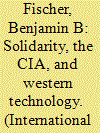

|
|
|
| 12 |
ID:
103660
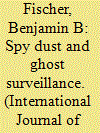

|
|
|
|
|
|
|
|